Wonderland Ltd: Corporate Law, Business Associations Case Study
VerifiedAdded on 2023/04/25
|9
|2830
|315
Case Study
AI Summary
This case study provides a detailed analysis of Wonderland Ltd. focusing on various aspects of business associations and corporate law. It addresses questions related to the director's apparent authority and potential liability in contractual agreements, particularly concerning a $1 million debt to a CPU supplier. The study also examines the significance of quorum requirements in board meetings and the validity of resolutions passed in its absence, referencing relevant case law to support the analysis. Furthermore, it explores the rights of shareholders and their ability to impose restrictions on the company's business activities through amendments to the articles of association. The study emphasizes the importance of adhering to corporate governance principles and legal provisions to ensure the proper functioning and protection of stakeholders' interests within Wonderland Ltd. Desklib provides access to this case study along with a wealth of resources, including past papers and solved assignments, tailored to aid students in their academic pursuits.

BUSINESS ASSOCIATIONS:
ASSIGNMENT QUESTIONS
ASSIGNMENT QUESTIONS
Paraphrase This Document
Need a fresh take? Get an instant paraphrase of this document with our AI Paraphraser

Table of Contents
Question 1..................................................................................................................................3
Question 2..................................................................................................................................4
Question 3..................................................................................................................................6
References..................................................................................................................................8
Question 1..................................................................................................................................3
Question 2..................................................................................................................................4
Question 3..................................................................................................................................6
References..................................................................................................................................8
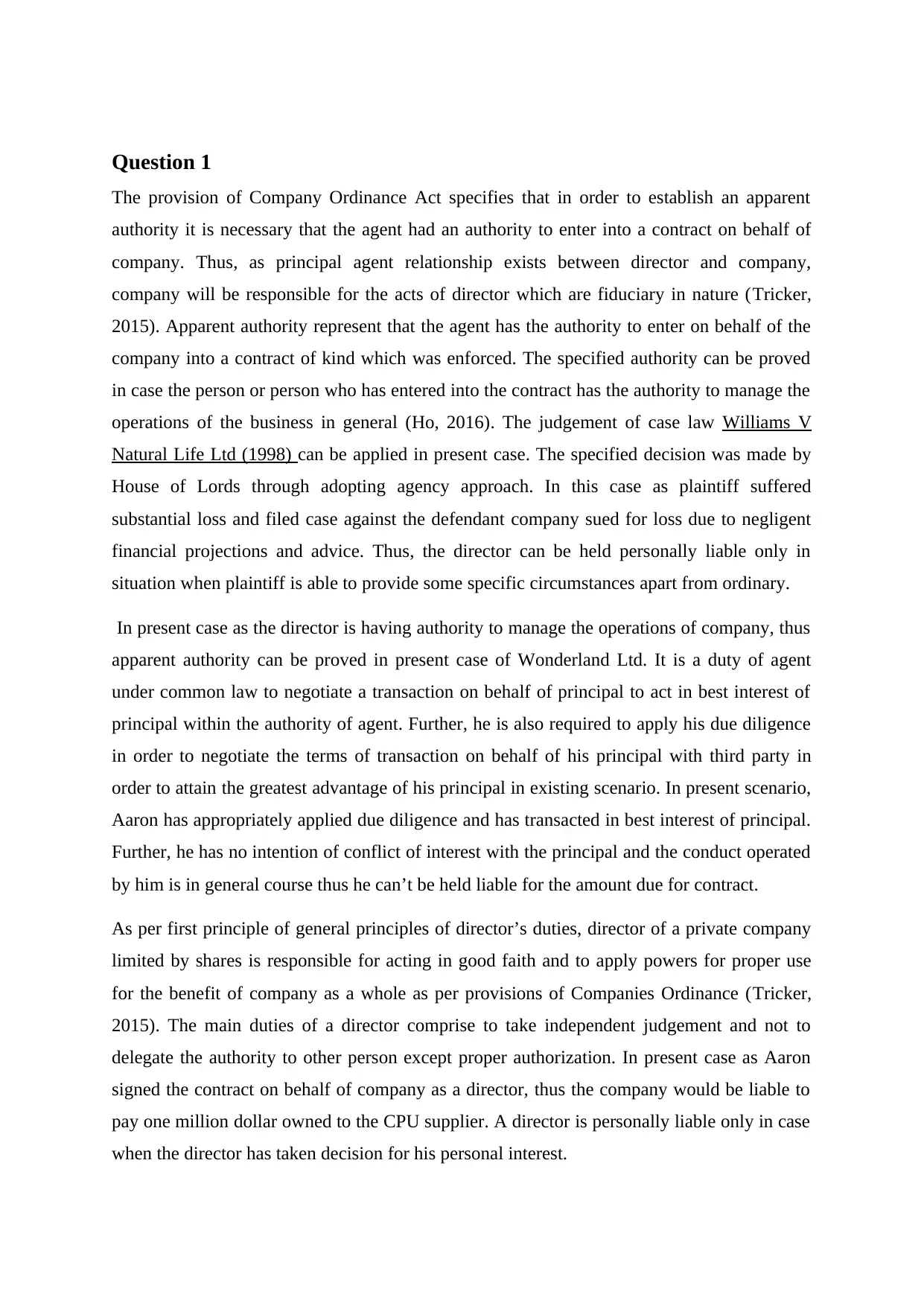
Question 1
The provision of Company Ordinance Act specifies that in order to establish an apparent
authority it is necessary that the agent had an authority to enter into a contract on behalf of
company. Thus, as principal agent relationship exists between director and company,
company will be responsible for the acts of director which are fiduciary in nature (Tricker,
2015). Apparent authority represent that the agent has the authority to enter on behalf of the
company into a contract of kind which was enforced. The specified authority can be proved
in case the person or person who has entered into the contract has the authority to manage the
operations of the business in general (Ho, 2016). The judgement of case law Williams V
Natural Life Ltd (1998) can be applied in present case. The specified decision was made by
House of Lords through adopting agency approach. In this case as plaintiff suffered
substantial loss and filed case against the defendant company sued for loss due to negligent
financial projections and advice. Thus, the director can be held personally liable only in
situation when plaintiff is able to provide some specific circumstances apart from ordinary.
In present case as the director is having authority to manage the operations of company, thus
apparent authority can be proved in present case of Wonderland Ltd. It is a duty of agent
under common law to negotiate a transaction on behalf of principal to act in best interest of
principal within the authority of agent. Further, he is also required to apply his due diligence
in order to negotiate the terms of transaction on behalf of his principal with third party in
order to attain the greatest advantage of his principal in existing scenario. In present scenario,
Aaron has appropriately applied due diligence and has transacted in best interest of principal.
Further, he has no intention of conflict of interest with the principal and the conduct operated
by him is in general course thus he can’t be held liable for the amount due for contract.
As per first principle of general principles of director’s duties, director of a private company
limited by shares is responsible for acting in good faith and to apply powers for proper use
for the benefit of company as a whole as per provisions of Companies Ordinance (Tricker,
2015). The main duties of a director comprise to take independent judgement and not to
delegate the authority to other person except proper authorization. In present case as Aaron
signed the contract on behalf of company as a director, thus the company would be liable to
pay one million dollar owned to the CPU supplier. A director is personally liable only in case
when the director has taken decision for his personal interest.
The provision of Company Ordinance Act specifies that in order to establish an apparent
authority it is necessary that the agent had an authority to enter into a contract on behalf of
company. Thus, as principal agent relationship exists between director and company,
company will be responsible for the acts of director which are fiduciary in nature (Tricker,
2015). Apparent authority represent that the agent has the authority to enter on behalf of the
company into a contract of kind which was enforced. The specified authority can be proved
in case the person or person who has entered into the contract has the authority to manage the
operations of the business in general (Ho, 2016). The judgement of case law Williams V
Natural Life Ltd (1998) can be applied in present case. The specified decision was made by
House of Lords through adopting agency approach. In this case as plaintiff suffered
substantial loss and filed case against the defendant company sued for loss due to negligent
financial projections and advice. Thus, the director can be held personally liable only in
situation when plaintiff is able to provide some specific circumstances apart from ordinary.
In present case as the director is having authority to manage the operations of company, thus
apparent authority can be proved in present case of Wonderland Ltd. It is a duty of agent
under common law to negotiate a transaction on behalf of principal to act in best interest of
principal within the authority of agent. Further, he is also required to apply his due diligence
in order to negotiate the terms of transaction on behalf of his principal with third party in
order to attain the greatest advantage of his principal in existing scenario. In present scenario,
Aaron has appropriately applied due diligence and has transacted in best interest of principal.
Further, he has no intention of conflict of interest with the principal and the conduct operated
by him is in general course thus he can’t be held liable for the amount due for contract.
As per first principle of general principles of director’s duties, director of a private company
limited by shares is responsible for acting in good faith and to apply powers for proper use
for the benefit of company as a whole as per provisions of Companies Ordinance (Tricker,
2015). The main duties of a director comprise to take independent judgement and not to
delegate the authority to other person except proper authorization. In present case as Aaron
signed the contract on behalf of company as a director, thus the company would be liable to
pay one million dollar owned to the CPU supplier. A director is personally liable only in case
when the director has taken decision for his personal interest.
⊘ This is a preview!⊘
Do you want full access?
Subscribe today to unlock all pages.

Trusted by 1+ million students worldwide
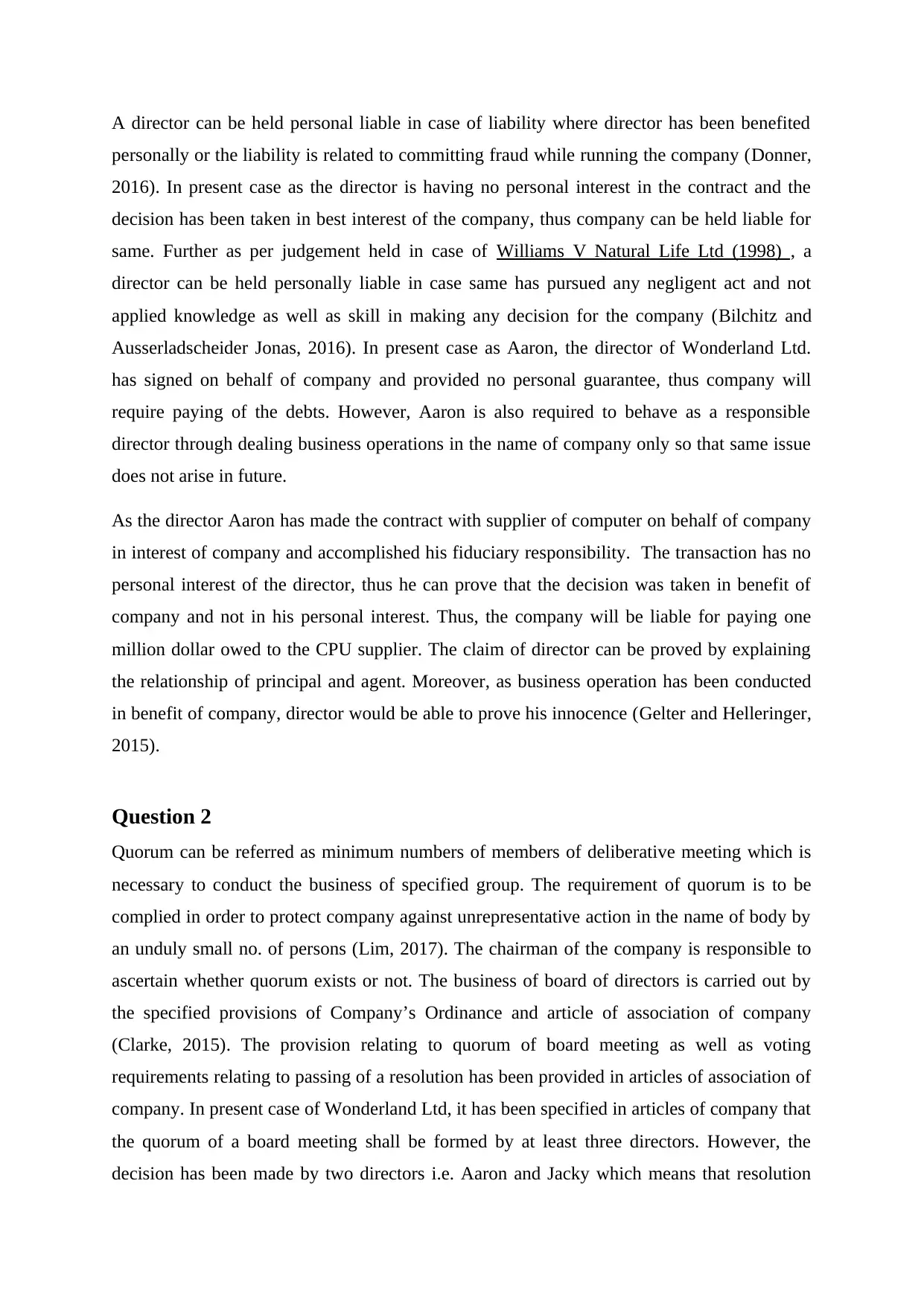
A director can be held personal liable in case of liability where director has been benefited
personally or the liability is related to committing fraud while running the company (Donner,
2016). In present case as the director is having no personal interest in the contract and the
decision has been taken in best interest of the company, thus company can be held liable for
same. Further as per judgement held in case of Williams V Natural Life Ltd (1998) , a
director can be held personally liable in case same has pursued any negligent act and not
applied knowledge as well as skill in making any decision for the company (Bilchitz and
Ausserladscheider Jonas, 2016). In present case as Aaron, the director of Wonderland Ltd.
has signed on behalf of company and provided no personal guarantee, thus company will
require paying of the debts. However, Aaron is also required to behave as a responsible
director through dealing business operations in the name of company only so that same issue
does not arise in future.
As the director Aaron has made the contract with supplier of computer on behalf of company
in interest of company and accomplished his fiduciary responsibility. The transaction has no
personal interest of the director, thus he can prove that the decision was taken in benefit of
company and not in his personal interest. Thus, the company will be liable for paying one
million dollar owed to the CPU supplier. The claim of director can be proved by explaining
the relationship of principal and agent. Moreover, as business operation has been conducted
in benefit of company, director would be able to prove his innocence (Gelter and Helleringer,
2015).
Question 2
Quorum can be referred as minimum numbers of members of deliberative meeting which is
necessary to conduct the business of specified group. The requirement of quorum is to be
complied in order to protect company against unrepresentative action in the name of body by
an unduly small no. of persons (Lim, 2017). The chairman of the company is responsible to
ascertain whether quorum exists or not. The business of board of directors is carried out by
the specified provisions of Company’s Ordinance and article of association of company
(Clarke, 2015). The provision relating to quorum of board meeting as well as voting
requirements relating to passing of a resolution has been provided in articles of association of
company. In present case of Wonderland Ltd, it has been specified in articles of company that
the quorum of a board meeting shall be formed by at least three directors. However, the
decision has been made by two directors i.e. Aaron and Jacky which means that resolution
personally or the liability is related to committing fraud while running the company (Donner,
2016). In present case as the director is having no personal interest in the contract and the
decision has been taken in best interest of the company, thus company can be held liable for
same. Further as per judgement held in case of Williams V Natural Life Ltd (1998) , a
director can be held personally liable in case same has pursued any negligent act and not
applied knowledge as well as skill in making any decision for the company (Bilchitz and
Ausserladscheider Jonas, 2016). In present case as Aaron, the director of Wonderland Ltd.
has signed on behalf of company and provided no personal guarantee, thus company will
require paying of the debts. However, Aaron is also required to behave as a responsible
director through dealing business operations in the name of company only so that same issue
does not arise in future.
As the director Aaron has made the contract with supplier of computer on behalf of company
in interest of company and accomplished his fiduciary responsibility. The transaction has no
personal interest of the director, thus he can prove that the decision was taken in benefit of
company and not in his personal interest. Thus, the company will be liable for paying one
million dollar owed to the CPU supplier. The claim of director can be proved by explaining
the relationship of principal and agent. Moreover, as business operation has been conducted
in benefit of company, director would be able to prove his innocence (Gelter and Helleringer,
2015).
Question 2
Quorum can be referred as minimum numbers of members of deliberative meeting which is
necessary to conduct the business of specified group. The requirement of quorum is to be
complied in order to protect company against unrepresentative action in the name of body by
an unduly small no. of persons (Lim, 2017). The chairman of the company is responsible to
ascertain whether quorum exists or not. The business of board of directors is carried out by
the specified provisions of Company’s Ordinance and article of association of company
(Clarke, 2015). The provision relating to quorum of board meeting as well as voting
requirements relating to passing of a resolution has been provided in articles of association of
company. In present case of Wonderland Ltd, it has been specified in articles of company that
the quorum of a board meeting shall be formed by at least three directors. However, the
decision has been made by two directors i.e. Aaron and Jacky which means that resolution
Paraphrase This Document
Need a fresh take? Get an instant paraphrase of this document with our AI Paraphraser
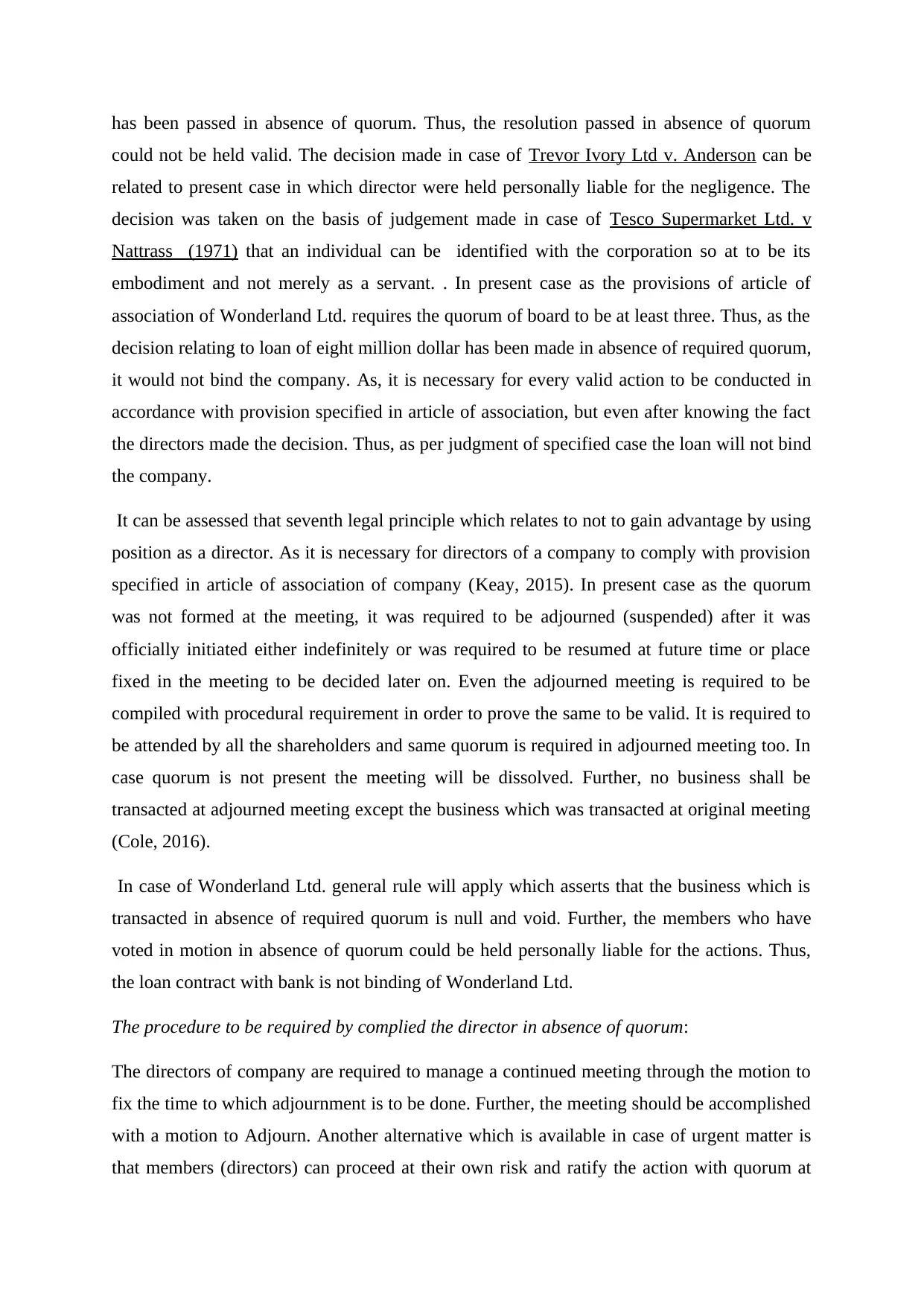
has been passed in absence of quorum. Thus, the resolution passed in absence of quorum
could not be held valid. The decision made in case of Trevor Ivory Ltd v. Anderson can be
related to present case in which director were held personally liable for the negligence. The
decision was taken on the basis of judgement made in case of Tesco Supermarket Ltd. v
Nattrass (1971) that an individual can be identified with the corporation so at to be its
embodiment and not merely as a servant. . In present case as the provisions of article of
association of Wonderland Ltd. requires the quorum of board to be at least three. Thus, as the
decision relating to loan of eight million dollar has been made in absence of required quorum,
it would not bind the company. As, it is necessary for every valid action to be conducted in
accordance with provision specified in article of association, but even after knowing the fact
the directors made the decision. Thus, as per judgment of specified case the loan will not bind
the company.
It can be assessed that seventh legal principle which relates to not to gain advantage by using
position as a director. As it is necessary for directors of a company to comply with provision
specified in article of association of company (Keay, 2015). In present case as the quorum
was not formed at the meeting, it was required to be adjourned (suspended) after it was
officially initiated either indefinitely or was required to be resumed at future time or place
fixed in the meeting to be decided later on. Even the adjourned meeting is required to be
compiled with procedural requirement in order to prove the same to be valid. It is required to
be attended by all the shareholders and same quorum is required in adjourned meeting too. In
case quorum is not present the meeting will be dissolved. Further, no business shall be
transacted at adjourned meeting except the business which was transacted at original meeting
(Cole, 2016).
In case of Wonderland Ltd. general rule will apply which asserts that the business which is
transacted in absence of required quorum is null and void. Further, the members who have
voted in motion in absence of quorum could be held personally liable for the actions. Thus,
the loan contract with bank is not binding of Wonderland Ltd.
The procedure to be required by complied the director in absence of quorum:
The directors of company are required to manage a continued meeting through the motion to
fix the time to which adjournment is to be done. Further, the meeting should be accomplished
with a motion to Adjourn. Another alternative which is available in case of urgent matter is
that members (directors) can proceed at their own risk and ratify the action with quorum at
could not be held valid. The decision made in case of Trevor Ivory Ltd v. Anderson can be
related to present case in which director were held personally liable for the negligence. The
decision was taken on the basis of judgement made in case of Tesco Supermarket Ltd. v
Nattrass (1971) that an individual can be identified with the corporation so at to be its
embodiment and not merely as a servant. . In present case as the provisions of article of
association of Wonderland Ltd. requires the quorum of board to be at least three. Thus, as the
decision relating to loan of eight million dollar has been made in absence of required quorum,
it would not bind the company. As, it is necessary for every valid action to be conducted in
accordance with provision specified in article of association, but even after knowing the fact
the directors made the decision. Thus, as per judgment of specified case the loan will not bind
the company.
It can be assessed that seventh legal principle which relates to not to gain advantage by using
position as a director. As it is necessary for directors of a company to comply with provision
specified in article of association of company (Keay, 2015). In present case as the quorum
was not formed at the meeting, it was required to be adjourned (suspended) after it was
officially initiated either indefinitely or was required to be resumed at future time or place
fixed in the meeting to be decided later on. Even the adjourned meeting is required to be
compiled with procedural requirement in order to prove the same to be valid. It is required to
be attended by all the shareholders and same quorum is required in adjourned meeting too. In
case quorum is not present the meeting will be dissolved. Further, no business shall be
transacted at adjourned meeting except the business which was transacted at original meeting
(Cole, 2016).
In case of Wonderland Ltd. general rule will apply which asserts that the business which is
transacted in absence of required quorum is null and void. Further, the members who have
voted in motion in absence of quorum could be held personally liable for the actions. Thus,
the loan contract with bank is not binding of Wonderland Ltd.
The procedure to be required by complied the director in absence of quorum:
The directors of company are required to manage a continued meeting through the motion to
fix the time to which adjournment is to be done. Further, the meeting should be accomplished
with a motion to Adjourn. Another alternative which is available in case of urgent matter is
that members (directors) can proceed at their own risk and ratify the action with quorum at
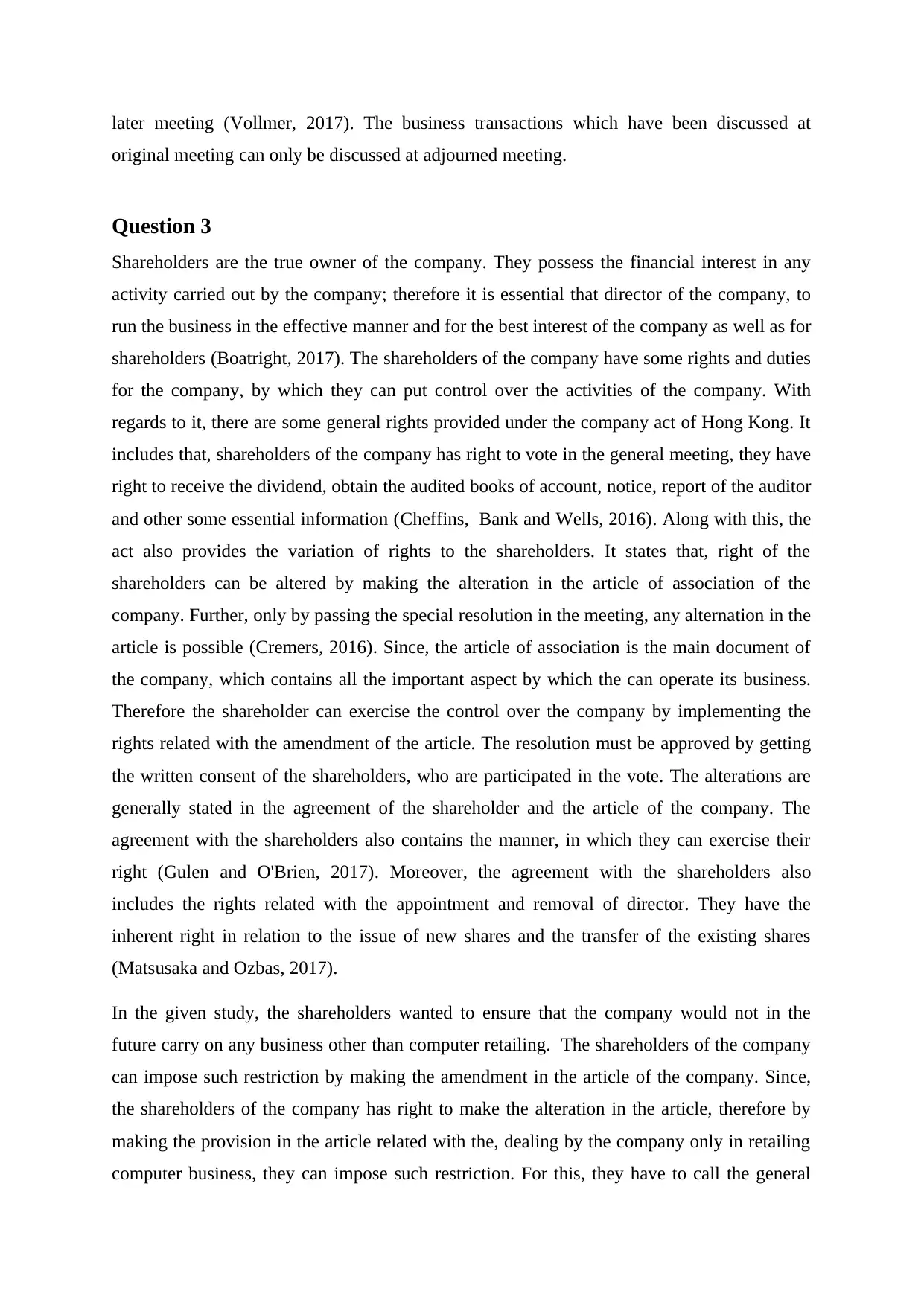
later meeting (Vollmer, 2017). The business transactions which have been discussed at
original meeting can only be discussed at adjourned meeting.
Question 3
Shareholders are the true owner of the company. They possess the financial interest in any
activity carried out by the company; therefore it is essential that director of the company, to
run the business in the effective manner and for the best interest of the company as well as for
shareholders (Boatright, 2017). The shareholders of the company have some rights and duties
for the company, by which they can put control over the activities of the company. With
regards to it, there are some general rights provided under the company act of Hong Kong. It
includes that, shareholders of the company has right to vote in the general meeting, they have
right to receive the dividend, obtain the audited books of account, notice, report of the auditor
and other some essential information (Cheffins, Bank and Wells, 2016). Along with this, the
act also provides the variation of rights to the shareholders. It states that, right of the
shareholders can be altered by making the alteration in the article of association of the
company. Further, only by passing the special resolution in the meeting, any alternation in the
article is possible (Cremers, 2016). Since, the article of association is the main document of
the company, which contains all the important aspect by which the can operate its business.
Therefore the shareholder can exercise the control over the company by implementing the
rights related with the amendment of the article. The resolution must be approved by getting
the written consent of the shareholders, who are participated in the vote. The alterations are
generally stated in the agreement of the shareholder and the article of the company. The
agreement with the shareholders also contains the manner, in which they can exercise their
right (Gulen and O'Brien, 2017). Moreover, the agreement with the shareholders also
includes the rights related with the appointment and removal of director. They have the
inherent right in relation to the issue of new shares and the transfer of the existing shares
(Matsusaka and Ozbas, 2017).
In the given study, the shareholders wanted to ensure that the company would not in the
future carry on any business other than computer retailing. The shareholders of the company
can impose such restriction by making the amendment in the article of the company. Since,
the shareholders of the company has right to make the alteration in the article, therefore by
making the provision in the article related with the, dealing by the company only in retailing
computer business, they can impose such restriction. For this, they have to call the general
original meeting can only be discussed at adjourned meeting.
Question 3
Shareholders are the true owner of the company. They possess the financial interest in any
activity carried out by the company; therefore it is essential that director of the company, to
run the business in the effective manner and for the best interest of the company as well as for
shareholders (Boatright, 2017). The shareholders of the company have some rights and duties
for the company, by which they can put control over the activities of the company. With
regards to it, there are some general rights provided under the company act of Hong Kong. It
includes that, shareholders of the company has right to vote in the general meeting, they have
right to receive the dividend, obtain the audited books of account, notice, report of the auditor
and other some essential information (Cheffins, Bank and Wells, 2016). Along with this, the
act also provides the variation of rights to the shareholders. It states that, right of the
shareholders can be altered by making the alteration in the article of association of the
company. Further, only by passing the special resolution in the meeting, any alternation in the
article is possible (Cremers, 2016). Since, the article of association is the main document of
the company, which contains all the important aspect by which the can operate its business.
Therefore the shareholder can exercise the control over the company by implementing the
rights related with the amendment of the article. The resolution must be approved by getting
the written consent of the shareholders, who are participated in the vote. The alterations are
generally stated in the agreement of the shareholder and the article of the company. The
agreement with the shareholders also contains the manner, in which they can exercise their
right (Gulen and O'Brien, 2017). Moreover, the agreement with the shareholders also
includes the rights related with the appointment and removal of director. They have the
inherent right in relation to the issue of new shares and the transfer of the existing shares
(Matsusaka and Ozbas, 2017).
In the given study, the shareholders wanted to ensure that the company would not in the
future carry on any business other than computer retailing. The shareholders of the company
can impose such restriction by making the amendment in the article of the company. Since,
the shareholders of the company has right to make the alteration in the article, therefore by
making the provision in the article related with the, dealing by the company only in retailing
computer business, they can impose such restriction. For this, they have to call the general
⊘ This is a preview!⊘
Do you want full access?
Subscribe today to unlock all pages.

Trusted by 1+ million students worldwide
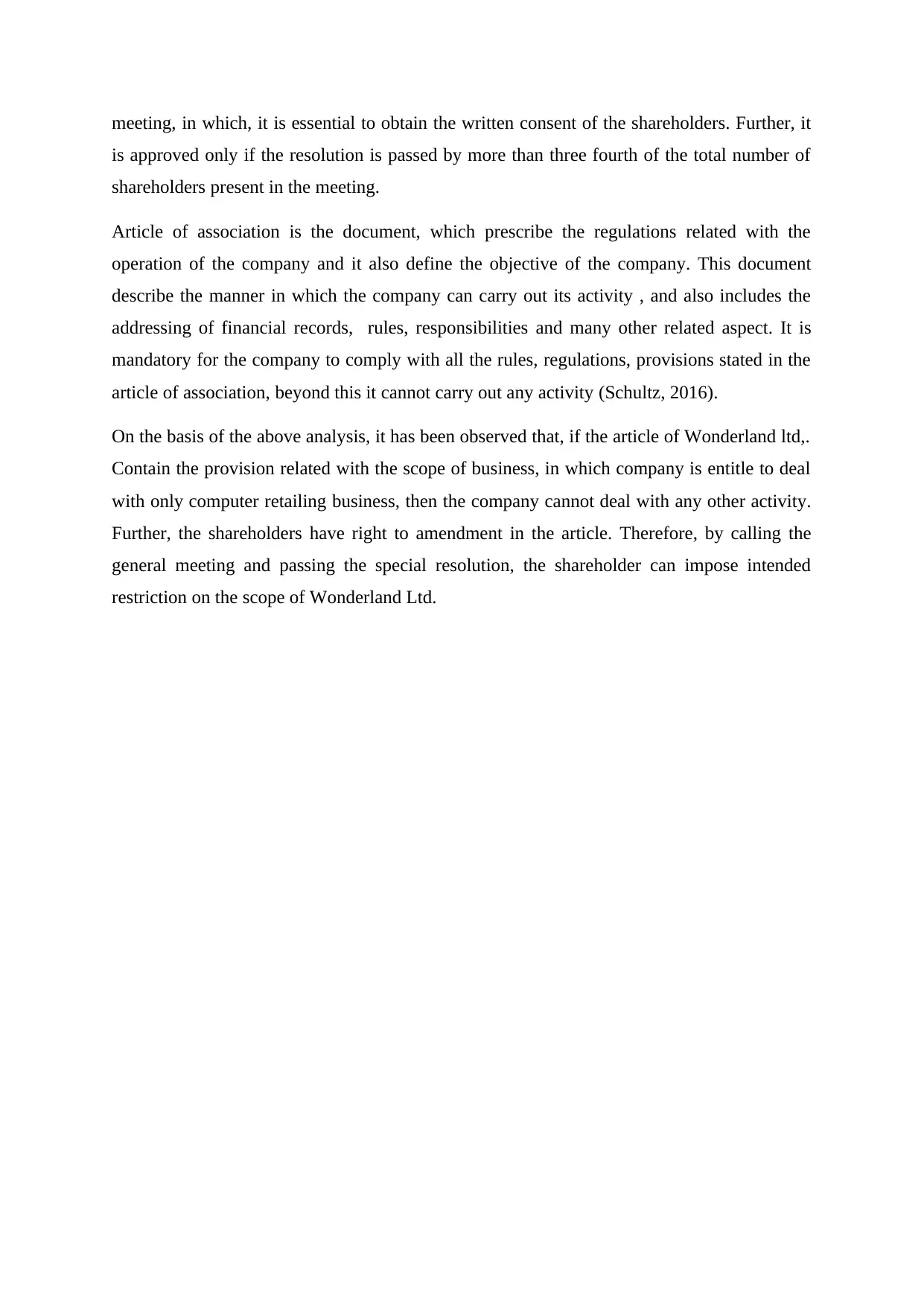
meeting, in which, it is essential to obtain the written consent of the shareholders. Further, it
is approved only if the resolution is passed by more than three fourth of the total number of
shareholders present in the meeting.
Article of association is the document, which prescribe the regulations related with the
operation of the company and it also define the objective of the company. This document
describe the manner in which the company can carry out its activity , and also includes the
addressing of financial records, rules, responsibilities and many other related aspect. It is
mandatory for the company to comply with all the rules, regulations, provisions stated in the
article of association, beyond this it cannot carry out any activity (Schultz, 2016).
On the basis of the above analysis, it has been observed that, if the article of Wonderland ltd,.
Contain the provision related with the scope of business, in which company is entitle to deal
with only computer retailing business, then the company cannot deal with any other activity.
Further, the shareholders have right to amendment in the article. Therefore, by calling the
general meeting and passing the special resolution, the shareholder can impose intended
restriction on the scope of Wonderland Ltd.
is approved only if the resolution is passed by more than three fourth of the total number of
shareholders present in the meeting.
Article of association is the document, which prescribe the regulations related with the
operation of the company and it also define the objective of the company. This document
describe the manner in which the company can carry out its activity , and also includes the
addressing of financial records, rules, responsibilities and many other related aspect. It is
mandatory for the company to comply with all the rules, regulations, provisions stated in the
article of association, beyond this it cannot carry out any activity (Schultz, 2016).
On the basis of the above analysis, it has been observed that, if the article of Wonderland ltd,.
Contain the provision related with the scope of business, in which company is entitle to deal
with only computer retailing business, then the company cannot deal with any other activity.
Further, the shareholders have right to amendment in the article. Therefore, by calling the
general meeting and passing the special resolution, the shareholder can impose intended
restriction on the scope of Wonderland Ltd.
Paraphrase This Document
Need a fresh take? Get an instant paraphrase of this document with our AI Paraphraser
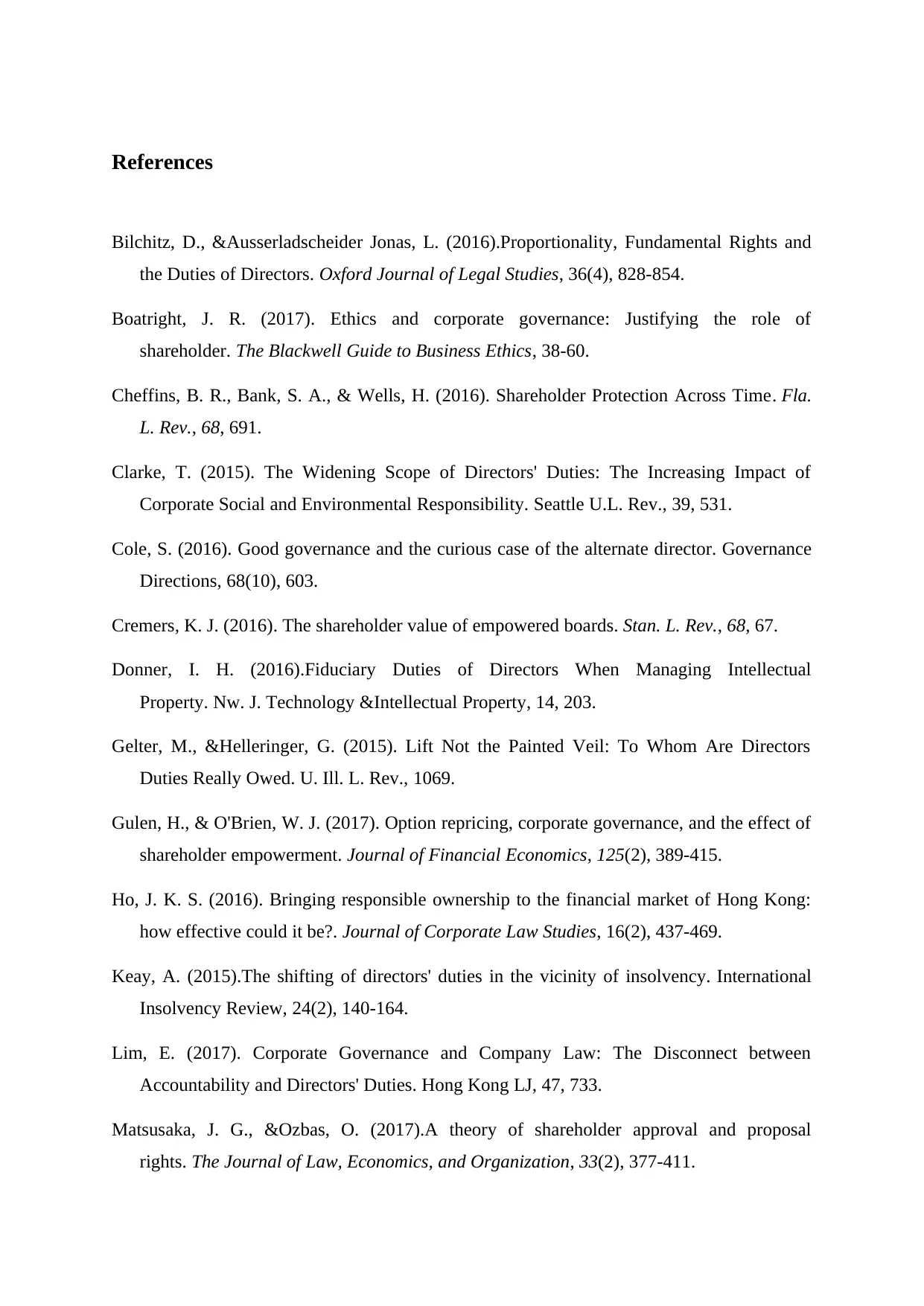
References
Bilchitz, D., &Ausserladscheider Jonas, L. (2016).Proportionality, Fundamental Rights and
the Duties of Directors. Oxford Journal of Legal Studies, 36(4), 828-854.
Boatright, J. R. (2017). Ethics and corporate governance: Justifying the role of
shareholder. The Blackwell Guide to Business Ethics, 38-60.
Cheffins, B. R., Bank, S. A., & Wells, H. (2016). Shareholder Protection Across Time. Fla.
L. Rev., 68, 691.
Clarke, T. (2015). The Widening Scope of Directors' Duties: The Increasing Impact of
Corporate Social and Environmental Responsibility. Seattle U.L. Rev., 39, 531.
Cole, S. (2016). Good governance and the curious case of the alternate director. Governance
Directions, 68(10), 603.
Cremers, K. J. (2016). The shareholder value of empowered boards. Stan. L. Rev., 68, 67.
Donner, I. H. (2016).Fiduciary Duties of Directors When Managing Intellectual
Property. Nw. J. Technology &Intellectual Property, 14, 203.
Gelter, M., &Helleringer, G. (2015). Lift Not the Painted Veil: To Whom Are Directors
Duties Really Owed. U. Ill. L. Rev., 1069.
Gulen, H., & O'Brien, W. J. (2017). Option repricing, corporate governance, and the effect of
shareholder empowerment. Journal of Financial Economics, 125(2), 389-415.
Ho, J. K. S. (2016). Bringing responsible ownership to the financial market of Hong Kong:
how effective could it be?. Journal of Corporate Law Studies, 16(2), 437-469.
Keay, A. (2015).The shifting of directors' duties in the vicinity of insolvency. International
Insolvency Review, 24(2), 140-164.
Lim, E. (2017). Corporate Governance and Company Law: The Disconnect between
Accountability and Directors' Duties. Hong Kong LJ, 47, 733.
Matsusaka, J. G., &Ozbas, O. (2017).A theory of shareholder approval and proposal
rights. The Journal of Law, Economics, and Organization, 33(2), 377-411.
Bilchitz, D., &Ausserladscheider Jonas, L. (2016).Proportionality, Fundamental Rights and
the Duties of Directors. Oxford Journal of Legal Studies, 36(4), 828-854.
Boatright, J. R. (2017). Ethics and corporate governance: Justifying the role of
shareholder. The Blackwell Guide to Business Ethics, 38-60.
Cheffins, B. R., Bank, S. A., & Wells, H. (2016). Shareholder Protection Across Time. Fla.
L. Rev., 68, 691.
Clarke, T. (2015). The Widening Scope of Directors' Duties: The Increasing Impact of
Corporate Social and Environmental Responsibility. Seattle U.L. Rev., 39, 531.
Cole, S. (2016). Good governance and the curious case of the alternate director. Governance
Directions, 68(10), 603.
Cremers, K. J. (2016). The shareholder value of empowered boards. Stan. L. Rev., 68, 67.
Donner, I. H. (2016).Fiduciary Duties of Directors When Managing Intellectual
Property. Nw. J. Technology &Intellectual Property, 14, 203.
Gelter, M., &Helleringer, G. (2015). Lift Not the Painted Veil: To Whom Are Directors
Duties Really Owed. U. Ill. L. Rev., 1069.
Gulen, H., & O'Brien, W. J. (2017). Option repricing, corporate governance, and the effect of
shareholder empowerment. Journal of Financial Economics, 125(2), 389-415.
Ho, J. K. S. (2016). Bringing responsible ownership to the financial market of Hong Kong:
how effective could it be?. Journal of Corporate Law Studies, 16(2), 437-469.
Keay, A. (2015).The shifting of directors' duties in the vicinity of insolvency. International
Insolvency Review, 24(2), 140-164.
Lim, E. (2017). Corporate Governance and Company Law: The Disconnect between
Accountability and Directors' Duties. Hong Kong LJ, 47, 733.
Matsusaka, J. G., &Ozbas, O. (2017).A theory of shareholder approval and proposal
rights. The Journal of Law, Economics, and Organization, 33(2), 377-411.
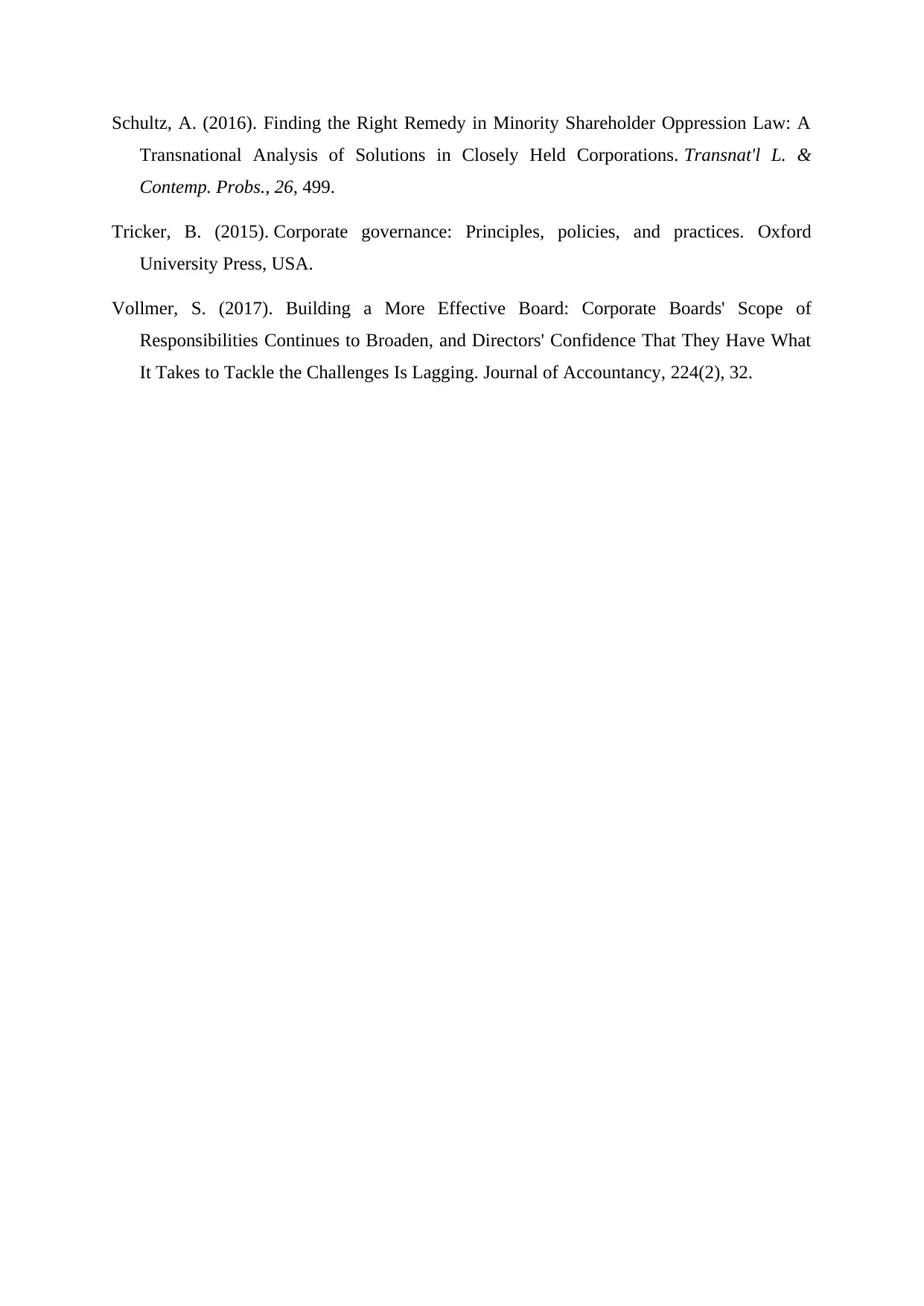
Schultz, A. (2016). Finding the Right Remedy in Minority Shareholder Oppression Law: A
Transnational Analysis of Solutions in Closely Held Corporations. Transnat'l L. &
Contemp. Probs., 26, 499.
Tricker, B. (2015). Corporate governance: Principles, policies, and practices. Oxford
University Press, USA.
Vollmer, S. (2017). Building a More Effective Board: Corporate Boards' Scope of
Responsibilities Continues to Broaden, and Directors' Confidence That They Have What
It Takes to Tackle the Challenges Is Lagging. Journal of Accountancy, 224(2), 32.
Transnational Analysis of Solutions in Closely Held Corporations. Transnat'l L. &
Contemp. Probs., 26, 499.
Tricker, B. (2015). Corporate governance: Principles, policies, and practices. Oxford
University Press, USA.
Vollmer, S. (2017). Building a More Effective Board: Corporate Boards' Scope of
Responsibilities Continues to Broaden, and Directors' Confidence That They Have What
It Takes to Tackle the Challenges Is Lagging. Journal of Accountancy, 224(2), 32.
⊘ This is a preview!⊘
Do you want full access?
Subscribe today to unlock all pages.

Trusted by 1+ million students worldwide
1 out of 9
Related Documents
Your All-in-One AI-Powered Toolkit for Academic Success.
+13062052269
info@desklib.com
Available 24*7 on WhatsApp / Email
![[object Object]](/_next/static/media/star-bottom.7253800d.svg)
Unlock your academic potential
Copyright © 2020–2026 A2Z Services. All Rights Reserved. Developed and managed by ZUCOL.





